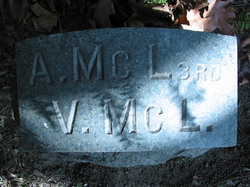Note: His grandfather (Andrew McLean I) and father (Andrew McLean II) are buried in the same plot. Andrew III's son, Andrew McLean IV, is buried at the Cedar Lawn Cemetery in Paterson, New Jersey.
*****************************
History of Bergen County and Passaic Counties, N.J. by W. Woodford Clayton and William Nelson-Published 1882 in Philadelphia by Everts and Peck-Press of J. B. Lippincott & Co., Philadelphia-Page 418
Andrew McLean III - "The father Mr. McLean[II] began the weaving of mosquito netting and similar goods in New York City so far back as 1826, where he continued the businss until his death in 1852. Soon after his son Andrew removed the business to Paterson, taking a part of the Beaver Mill, where he employed about thirty hands and had thirty-two looms. He carded, spun, and wove all his cotton. In the previous year, 1851, Mr. Andrew introduced the use of power-looms in weaving gauze mosquito netting, adapting four looms to that purpose. So far as he is aware he was the first to adopt the use of power-looms in weaving this kind of fabric. Some years later George McLean, a brother of Andrew, was taken into the firm, which leased larger quarters in the old Franklin Mill, where a large business was carried on until December, 1871, when the mill was burned down. Among the machinery of A. & G. McLean destroyed at this time was a pair of hand-mules, then in use, and doubtless the last run in Paterson. It is not at all likely that any more will ever be run in Paterson. The firm now removed to a frame building of Samuel Pope, on the north bank of the river, between Main and Bridge Streets, Paterson, N.J., where the business has since been carried on. George McLean was killed subsequently by the fall of an unfinished building at Passaic. The factory was continued from that time until the present by Andrew McLean alone. Mr. McLean now (February, 1882) occupies a two story frame building, sixty by forty feet, and a number of outbuildings, in the weaving of mosquito netting, buckrams, etc. He does no spinning, but buys his yarn and weaves it in this shop, employing 40 hands, whom he pays about $700 fortnightly. The woven fabrics are taken to new York, where Mr. McLean has facilities for finishing, etc., which branch of the business is carried on by him in the metropolis. He has kept the very excellent reputation which he long ago earned for the fine quality of his production."
Note: His grandfather (Andrew McLean I) and father (Andrew McLean II) are buried in the same plot. Andrew III's son, Andrew McLean IV, is buried at the Cedar Lawn Cemetery in Paterson, New Jersey.
*****************************
History of Bergen County and Passaic Counties, N.J. by W. Woodford Clayton and William Nelson-Published 1882 in Philadelphia by Everts and Peck-Press of J. B. Lippincott & Co., Philadelphia-Page 418
Andrew McLean III - "The father Mr. McLean[II] began the weaving of mosquito netting and similar goods in New York City so far back as 1826, where he continued the businss until his death in 1852. Soon after his son Andrew removed the business to Paterson, taking a part of the Beaver Mill, where he employed about thirty hands and had thirty-two looms. He carded, spun, and wove all his cotton. In the previous year, 1851, Mr. Andrew introduced the use of power-looms in weaving gauze mosquito netting, adapting four looms to that purpose. So far as he is aware he was the first to adopt the use of power-looms in weaving this kind of fabric. Some years later George McLean, a brother of Andrew, was taken into the firm, which leased larger quarters in the old Franklin Mill, where a large business was carried on until December, 1871, when the mill was burned down. Among the machinery of A. & G. McLean destroyed at this time was a pair of hand-mules, then in use, and doubtless the last run in Paterson. It is not at all likely that any more will ever be run in Paterson. The firm now removed to a frame building of Samuel Pope, on the north bank of the river, between Main and Bridge Streets, Paterson, N.J., where the business has since been carried on. George McLean was killed subsequently by the fall of an unfinished building at Passaic. The factory was continued from that time until the present by Andrew McLean alone. Mr. McLean now (February, 1882) occupies a two story frame building, sixty by forty feet, and a number of outbuildings, in the weaving of mosquito netting, buckrams, etc. He does no spinning, but buys his yarn and weaves it in this shop, employing 40 hands, whom he pays about $700 fortnightly. The woven fabrics are taken to new York, where Mr. McLean has facilities for finishing, etc., which branch of the business is carried on by him in the metropolis. He has kept the very excellent reputation which he long ago earned for the fine quality of his production."
Family Members
Advertisement
Records on Ancestry
Advertisement





















